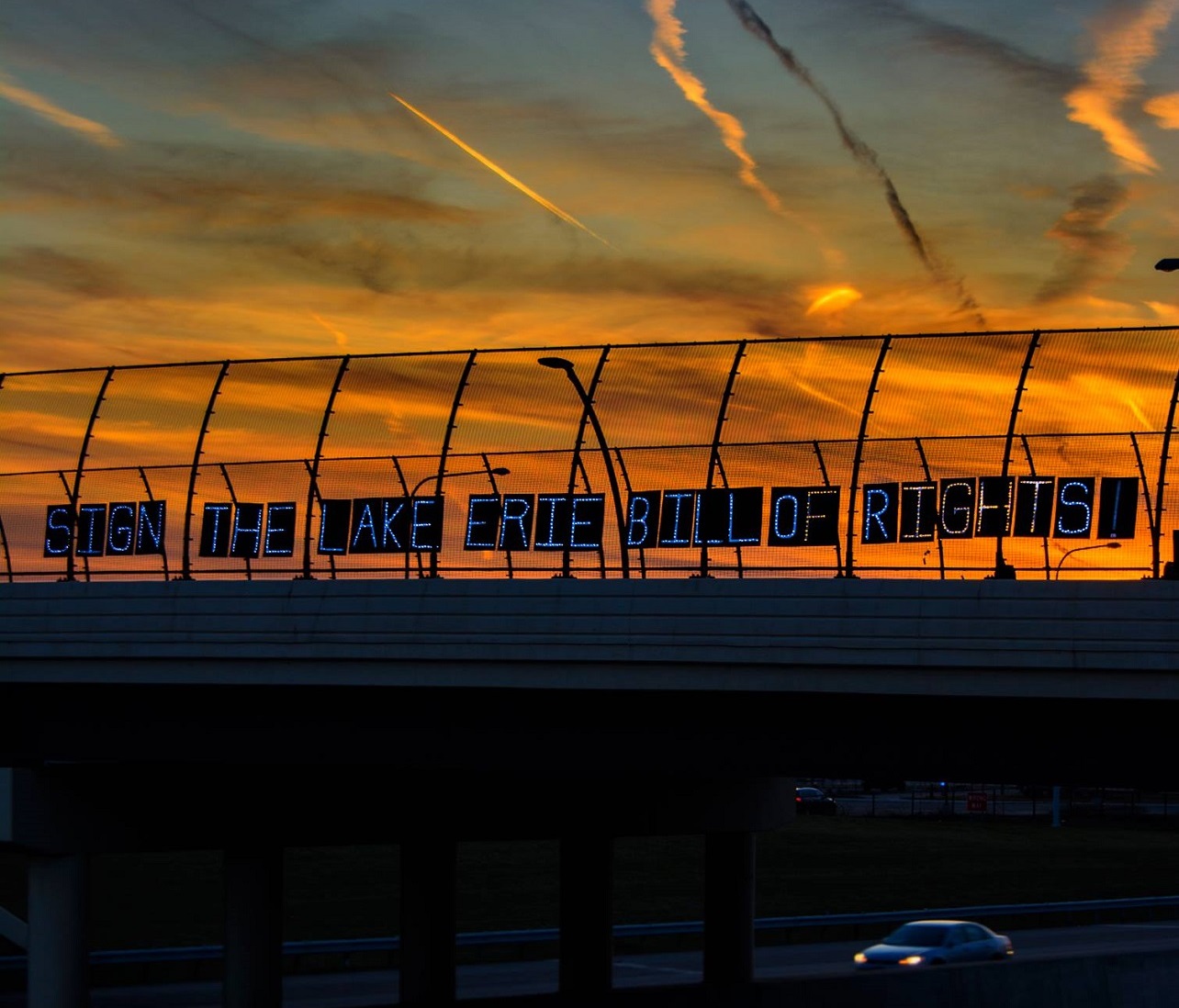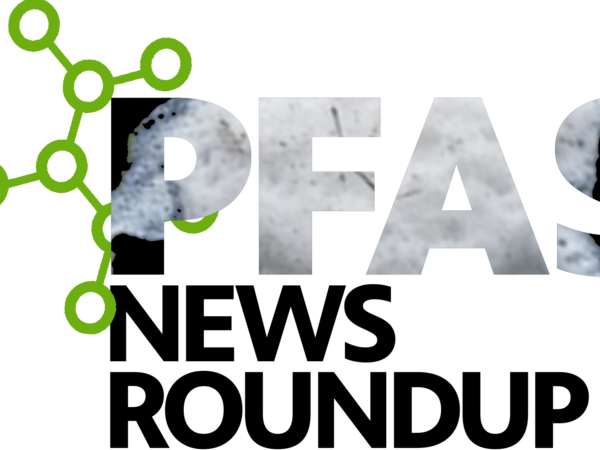
While the roller coaster case garnered national attention with its on-again, off-again Rights of Nature legal battle, Toledo residents are stuck paying legal fees for Drewes Farms Partnerships in its fight against the Lake Erie Bill of Rights, popularly referred to as LEBOR.
Owners of the Wood County crop farm filed a challenge to LEBOR the morning after its landslide February 2019 passage by Toledo voters. Eventually, a federal judge struck down the law, citing its vagueness and overreaching nature.
A legal bill from LEBOR challenger Drewes Farms presented to city officials in April was originally about $293,000.
According to the Community Environmental Legal Defense Fund, the Columbus-based corporate law firm of Vorys, Sater, Seymour and Pease most recently sought only $207,500 in legal fees from the city of Toledo, a 30% reduction.
“All of this has been kept under seal. That’s an interesting part of this, isn’t it?” said Tish O’Dell, a community organizer for CELDF. “People are expected to pay this amount, yet they can’t see any of the documents or negotiations that went back and forth.”
LEBOR was granted a miniscule shot at a new lease on life recently when an Ohio appeals court ruled a lower court erred when it dismissed a complaint filed by three Toledo residents. That complaint claimed the state violated the Ohio constitution by challenging LEBOR’s validity after voters approved the measure.
The ruling is considered a minor legal technicality, according to the Ohio Attorney General’s office, which has indicated it expects the issue to be dismissed.
Questions about who paid legal fees for DFP
Documents filed by the city after the April legal fees request questioned whether Drewes farms actually paid the VSSP fees and, if not, what arrangements are or were actually in place.
“Is DFP a real party in interest for the attorneys’ fees and costs award it seeks….? What fee arrangements are in place? Has any third party agreed to pay, or actually paid DFP’s attorneys’ fees or costs?” the documents read.
After the election, during which LEBOR was approved by 61% of voters, elections officials disclosed that more than $300,000 was provided to Toledo Jobs and Growth Coalition, an anti-LEBOR political action committee which ran TV, radio and mail ads. The main contributor was British Petroleum’s Houston-based office.
VSSP did not respond to any GLN questions about the fees it charged for the case.
According to O’Dell, the legal fees are a tactic meant to intimidate future activists who aim to protect natural resources.
“After paying for water treatment plant upgrades and their health by ingesting more chemicals and water treatment products, residents are now being asked to pay the legal fees for polluters,” she said.
Prospect of large legal fees used as deterrent?
Grant Township in southwest Pennsylvania is described as an ultra-rural community by Stacy W. Long, an elected township supervisor. She said there are no gas stations, storefronts, schools, fire or police departments, or other businesses in the 700-resident municipality.
“It’s literally fields, woods and 250 homes. We were coal mined to death at the beginning of the 20th century,” she said. “We have untold miles of underground, undocumented mines, and we had strip mining too. But we’re still pretty clean.”
And, Long said, it’s stayed clean due to an intense and protracted seven-year legal battle with Pennsylvania General Energy. The energy company aimed to turn an existing natural gas well in the township into a deep injection site for fracking waste from outside the township. The legal battle pitted the municipality, with total annual tax revenue from residents at about $32,000, against both PGE and the Pennsylvania Department of Environmental Protection.
Like Toledo, Grant Township residents approved a Community Bill of Rights ordinance prohibiting such injection sites. Despite an uphill legal battle, the township eventually prevailed with assistance from CELDF.
“Right now PGE doesn’t have a case because they don’t have a permit from the state, it was revoked,” Long said. “Currently PGE alleges they’re trying to sell assets and say if their buyer should want the well they’ll probably want to sue us over it.”
Despite the fact Grant Township does not currently have an injection well and appears likely to be free of them in the future, the municipality was still ordered to pay PGE legal fees from a previous case which pitted the township against the company.
The original court opinion against the township’s anti-injection well ordinance came out in October 2015. The very next month residents moved to change the nature of the township – eventually moving to a home rule charter. That maneuver also included a reinstatement the injection well ban.
A federal judge ruled in 2019 that Grant Township was liable for more than $600,000 in legal fees which PGE incurred. In the ruling, the judge cited complex and protracted litigation caused by the township’s legal strategy. Through negotiations, that number was reduced more than 80% to about $100,000 – still far more than it could afford.
Despite financial risk, township says battle worthwhile
Long says Grant Township could never have paid the larger sum.
“We understood we could owe legal fees, absolutely,” Long explained. “But losing money was definitely secondary to keeping the project from happening. We were way more frightened of PGE than becoming bankrupt.”
According to Long, CELDF agreed to pay the legal fees, which were subsequently reduced further.
“We were prepped that probably what would happen is that the state would have come in and overtaken our local government if we had filed bankruptcy and did not have the money to pay the bill,” Long said. “We were very frank about that from the beginning.”
O’Dell said scenarios like Grant Township’s and Toledo’s are meant to curtail people from protecting their natural resources.
“Drewes Farms is using the civil rights code as their personhood. The way it’s written, the civil rights code is if you bring a civil rights violation to court, if you win then the other side should pay your attorneys’ fees,” she said. “All because people tried to use their democratic, constitutional rights to pass a law because no one else is protecting them. My opinion is that it appears this is a way to punish communities that are trying to change the system and trying to protect their health.”
Markie Miller, one of the original activists with Toledoans for Safe Water, which began the LEBOR drive, agrees.
“Corporate interests and the state of Ohio are trying to make an example out of communities who threaten their power,” she said. “There is a pattern emerging of pushing communities who push for a change to protect nature.”
Toledoans for Safe Water will continue
“Having it as a law would be great, but for me it’s more about showing people it doesn’t have to be written for us to start caring about Lake Erie or Rights of Nature,” Miller said. “It’s about how we become that voice that says ‘Yeah, it was law, we voted for it but now we’re telling you we’re mindful of these projects, we’re mindful of threats against it.’ If projects and permits and different activities want to come in and present threats against those rights, then it’s my job to rally the community around those and get them to speak up against them. Do we really need a law that says we want clean water?”
Miller said TSW activism doesn’t necessarily have to take place in courtrooms.
“I definitely think we’re going to have to consider more direct action and protest tactics,” she said. “To me, it’s how angry are people going to get? The fight doesn’t have to take place in the court, it has to take place in the street, and it has to take place in discussions. It has to be pushed by people. Yeah, maybe that’s going to be the next step.”
Miller said she has heard from only one Toledo City Council member, Theresa Gadus, who wanted to know more about the most recent LEBOR development.
No council members responded to GLN requests for comment on the legal fees.
“The funny thing is council just approved an $800,000 expense for our water treatment facility,” Miller said. “So $207,000 or $800,000 — it wouldn’t seem all that big compared to what we’re pouring into our infrastructure just to keep our water drinkable. We’re still active, we’re still engaged and mindful of what’s going on. We’re not going anywhere this is our home and we’re going to stick around and we’re going to protect it.”
Read more on the Lake Erie Bill of Rights and similar situations on Great Lakes Now:
Finding the Funds: How the Lake Erie Bill of Rights campaigns were financed
Struck Down: Federal court rules Lake Erie Bill of Rights unconstitutional
Federal Hands: The future of the Lake Erie Bill of Rights rests in federal court
Lake Erie Activist Addresses United Nations on Earth Day
Featured image: Highway overpass sign erected by advocacy group Toledoans for Safe Water. (Photo by James Proffitt)




